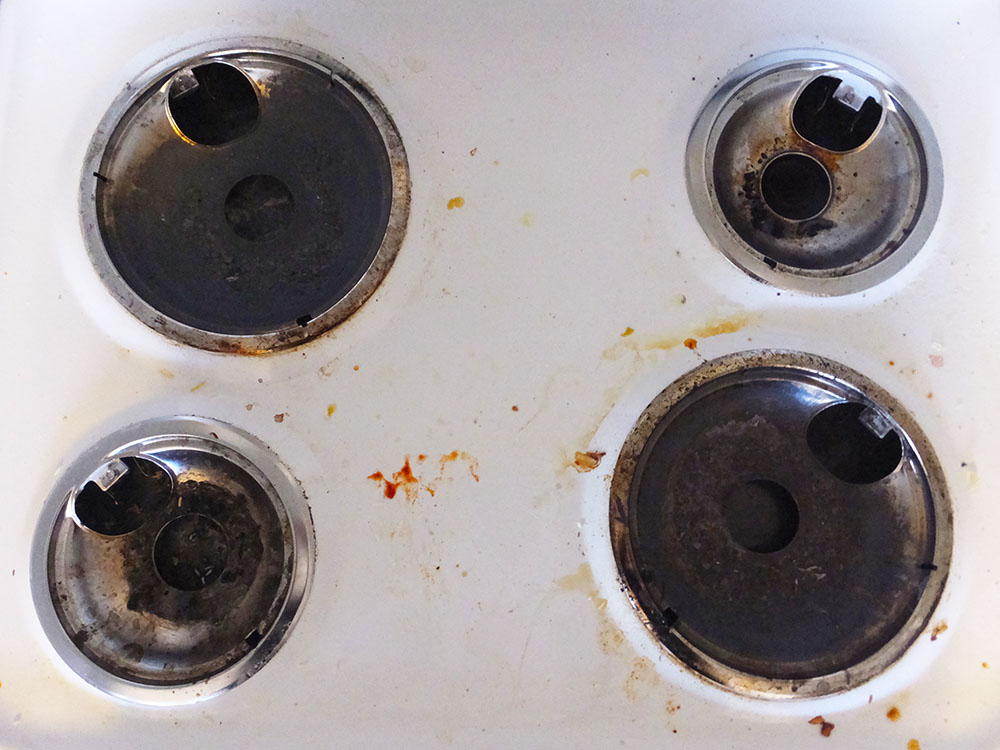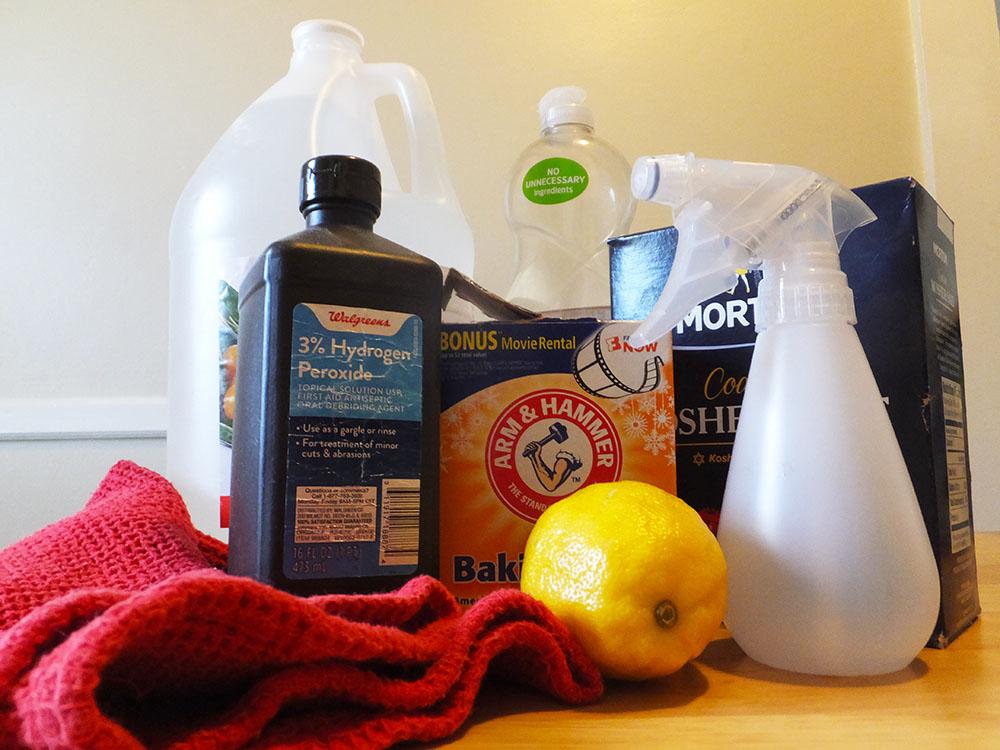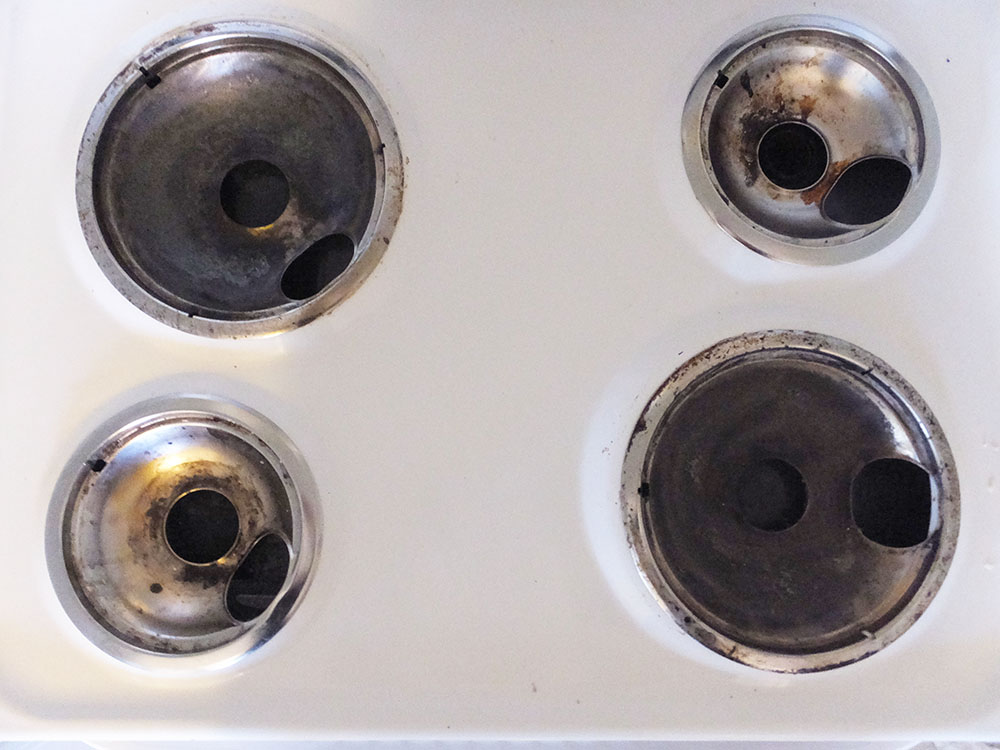I tested 4 natural stove top cleaners. Here’s what works.

Before ![]()
After
I’m a dirty chef. I let food splash everywhere when I’m cooking. I’ve had more than my fair share of pots boil over with hot water, broth and sauce. My apron looks like it’s been through war.
As such, I have an incredibly dirty stove top.
I grew up with a glass stove top, and let me tell you, I miss it. I now have an electric coil stove top, which is extremely prone to grime build up on both the coils and the burners underneath (and, in my case, the stovetop itself).
Generally, my approach to cleaning my oven is to not do it. I can’t stomach the idea — or, truthfully, the smell — of using harsh chemicals on the burners that cook my food.
When I almost started a grease fire in my kitchen, though, I figured it was time to change my kitchen cleaning habits.

I scoured the world wide web for natural stove top cleaners and modified four recipes I could make with items I had in my kitchen. As a caveat, my stove top was very unevenly dirty, so the visual representations of the progress are (like me as a chef) less-than-perfect.
Nevertheless, here is what I thought of some classic natural stove top cleaners.
¼ cup dish soap + ½ cup baking soda + ¼ cup hydrogen peroxide
Instructions
- If applicable, remove coil.
- Drizzle the dish soap over the affected areas.
- Sprinkle soapy spots with baking soda.
- Drizzle the hydrogen peroxide over the dish soap and baking soda paste.
- Let sit for 15 to 30 minutes.
- Scrub with a scrubbing pad.
- Wipe clean with a damp cloth or rinse and dry.
Overall, I liked this recipe. The paste was a little messy and difficult to remove and it took a fair amount of scrubbing (to be fair, this was one of the dirtier burners), but it did an alright job of cleaning up the grime. I felt like it wiped up the crusty bits underneath the burner even better than the relatively cosmetic black char on the stove top. Go figure.
1 tablespoon salt + 1 tablespoon baking soda + 1 tablespoon water
Instructions
- If applicable, remove coil.
- Create a paste out of the salt, baking soda and water.
- Use a dishcloth to apply generously to the dirty parts of your stove top.
- Scrub with a dry towel.
- Wipe clean with a damp cloth or rinse and dry.
This recipe is more of a scrub than a soak, so you do not have to let it sit like the others. The scrub did a pretty good job of clearing off the grime under the burner and on the stove top, but the especially burnt bits on the burner needed a little extra scrubbing. The salt made a great natural abrasive if you use a large grain like kosher salt. Of all the natural stove top cleaners, though, this one dried out my hands the most.
½ cup distilled white vinegar + ½ cup water
Instructions
- If applicable, remove coil.
- Mix white vinegar and water.
- Add the mixture to a spray bottle.
- Spray the affected areas generously.
- Let soak for about 15 to 30 minutes.
- Wipe clean with a dry cloth.
I’ll admit, I did not have a lot of faith in this recipe because of its simplicity, so I used it on one of the cleaner burners. It was pretty effective at getting the grime off the white stovetop, but the stuck on grease, little that there was, was not budging. I tried putting a little extra elbow grease into it in the form of a scrubbing pad, but no dice. Not to mention that, in my opinion, distilled white vinegar in such a nearly pure form smells only marginally better than chemical cleaners.
1 cup distilled white vinegar + ½ cup lemon juice + 1 teaspoon baking soda
Instructions
- If applicable, remove coil.
- Spread the baking soda over the affected area
- Combine distilled white vinegar and lemon juice.
- Add vinegar and lemon mixture to a clean spray bottle.
- Spray the baking soda-covered surfaces.
- Let sit for about 15 to 30 minutes
- Wipe clean with a damp cloth or rinse and dry.
I was surprised how much grime was wiped away on the first pass given that this was one of the dirtier burners. I had to refill the spray bottle and give it another go, but in general, this recipe worked better than I expected, not to mention that the combination of lemon and baking soda seemed to offset the vinegar smell.
The verdict
Some of these formulas were fairly effective, but I will be honest: none of these natural stove top cleaners particularly stood out above the rest as a clear winner. The abrasive power of the salt makes the task of scrubbing easier, but baking soda and distilled white vinegar seem to be a pretty potent combination as far as natural cleaners go. There was a clear loser, though: the vinegar mixed with water did not seem up to the task.
I don’t know if I have found my perfect natural stovetop cleaner out of this bunch — I may have to experiment a little bit more to figure it out — but my stove definitely looks better than when I started.
Regardless of which one you try for yourself, a word of advice: wear gloves. Just because your cleaner is natural, doesn’t mean it isn’t going to dry and crack your hands to heck.
Do you have a favorite natural stove top cleaner that I haven’t tried? Add it to the comments below.

